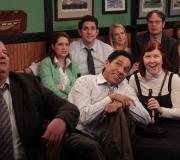Complete biography of Alexander Ivanovich Kuprin. Alexander Kuprin: biography, creativity and interesting facts from life
Alexander Ivanovich Kuprin is a famous writer, a classic of Russian literature, whose most significant works are “The Junkers”, “The Duel”, “The Pit”, “The Garnet Bracelet” and “The White Poodle”. Kuprin’s short stories about Russian life, emigration, and animals are also considered high art.
Alexander was born in the district town of Narovchat, which is located in the Penza region. But the writer spent his childhood and youth in Moscow. The fact is that Kuprin’s father, hereditary nobleman Ivan Ivanovich, died a year after his birth. Lyubov Alekseevna’s mother, who also came from a noble family, had to move to a large city, where it was much easier for her to give her son upbringing and education.
Already at the age of 6, Kuprin was sent to the Moscow Razumovsky boarding school, which operated on the principle of an orphanage. After 4 years, Alexander was transferred to the Second Moscow Cadet Corps, after which the young man entered the Alexander Military School. Kuprin graduated with the rank of second lieutenant and served for exactly 4 years in the Dnieper Infantry Regiment.

After his resignation, the 24-year-old young man leaves for Kyiv, then to Odessa, Sevastopol and other cities of the Russian Empire. The problem was that Alexander did not have any civilian specialty. Only after meeting him does he manage to find a permanent job: Kuprin goes to St. Petersburg and gets a job at the “Magazine for Everyone.” Later he would settle in Gatchina, where during the First World War he would maintain a military hospital at his own expense.
Alexander Kuprin enthusiastically accepted the abdication of the Tsar's power. After the arrival of the Bolsheviks, he even personally approached with a proposal to publish a special newspaper for the village “Zemlya”. But soon, seeing that the new government was imposing a dictatorship on the country, he became completely disillusioned with it.

It was Kuprin who came up with the derogatory name for the Soviet Union - “Sovdepiya”, which will become firmly established in the jargon. During the Civil War, he volunteered to join the White Army, and after a major defeat he went abroad - first to Finland and then to France.
By the early 30s, Kuprin was mired in debt and could not provide his family with even the most necessary things. In addition, the writer did not find anything better than to look for a way out of a difficult situation in a bottle. As a result, the only solution was to return to his homeland, which he personally supported in 1937.
Books
Alexander Kuprin began writing in his final years in the cadet corps, and his first attempts at writing were in the poetic genre. Unfortunately, the writer never published his poetry. And his first published story was “The Last Debut.” Later, his story “In the Dark” and a number of stories on military topics were published in magazines.
In general, Kuprin devotes a lot of space to the theme of the army, especially in his early works. Suffice it to recall his famous autobiographical novel “Junkers” and the story that preceded it “At the Turning Point”, also published as “Cadets”.

The dawn of Alexander Ivanovich as a writer came at the beginning of the 20th century. He published the story “The White Poodle,” which later became a classic of children’s literature, his memoirs about his trip to Odessa, “Gambrinus,” and, probably, his most popular work, the story “The Duel.” At the same time, such creations as “Liquid Sun”, “Garnet Bracelet”, and stories about animals were released.
Separately, it is necessary to say about one of the most scandalous works of Russian literature of that period - the story “The Pit” about the life and destinies of Russian prostitutes. The book was mercilessly criticized, paradoxically, for “excessive naturalism and realism.” The first edition of "The Pit" was withdrawn from publication as pornographic.

In exile, Alexander Kuprin wrote a lot, almost all of his works were popular with readers. In France, he created four major works - “The Dome of St. Isaac of Dalmatia”, “The Wheel of Time”, “Junker” and “Zhaneta”, as well as a large number of short stories, including the philosophical parable about beauty “The Blue Star”.
Personal life
The first wife of Alexander Ivanovich Kuprin was young Maria Davydova, the daughter of the famous cellist Karl Davydov. The marriage lasted only five years, but during this time the couple had a daughter, Lydia. The fate of this girl was tragic - she died shortly after giving birth to her son at the age of 21.

The writer married his second wife Elizaveta Moritsovna in 1909, although they had been living together for two years by that time. They had two daughters - Ksenia, who later became an actress and model, and Zinaida, who died at three years old from a complex form of pneumonia. The wife outlived Alexander Ivanovich by 4 years. She committed suicide during the siege of Leningrad, unable to withstand the constant bombing and endless hunger.

Since Kuprin’s only grandson, Alexei Egorov, died due to injuries received during World War II, the line of the famous writer was interrupted, and today his direct descendants do not exist.
Death
Alexander Kuprin returned to Russia with his health already in poor health. He was addicted to alcohol, plus the elderly man was quickly losing his sight. The writer hoped that he would be able to return to work in his homeland, but his health did not allow this.

A year later, while watching a military parade on Red Square, Alexander Ivanovich contracted pneumonia, which was also aggravated by esophageal cancer. On August 25, 1938, the famous writer’s heart stopped forever.
Kuprin’s grave is located on the Literary Bridge of the Volkovsky Cemetery, not far from the burial place of another Russian classic -.
Bibliography
- 1892 - “In the Dark”
- 1898 - “Olesya”
- 1900 - “At the Turning Point” (“Cadets”)
- 1905 - “Duel”
- 1907 - "Gambrinus"
- 1910 - “Garnet Bracelet”
- 1913 - “Liquid Sun”
- 1915 - “The Pit”
- 1928 - “Junkers”
- 1933 - “Zhaneta”
A.I. was born. Kuprin on August 26 (September 7 according to the new style) in the city of Narovchatov, in a poor family. He lost his father. When the boy was 6 years old, their family experienced the feeling of hunger, and as a result, the mother had to send her son to an orphanage in 1876, which was abandoned at the age of 10, then had to study at a military school in the same year, which later became known as like a cadet corps.
In 1888, Kuprin graduated and continued to gain knowledge at the Alexander School (from 1888-90), in which he described everything that happened to him in the story “At the Turning Point (Cadets)” and in the novel “Junker”. Afterwards, he took the oath to the Dnepropetrovsk regiment and later dreamed of entering such an honorable place as the Academy of the General Staff, but there was a failure due to a disagreement with a policeman, whom he, without thinking, threw into the water, which turned out to be a return coin for his act. Upset by this incident, he resigned in 1894.
The first work to be published was the story “The Last Debut,” published in 1889. From 1883 to 1894, such stories as “In the Dark,” “Moonlit Night,” and “Inquiry” were written. From 1897 to 1899, stories entitled “Night Shift”, “Overnight” and “Hike” were published, also in the list of his works there are: “Moloch”, “Yuzovsky Plant”, “Werewolf”, “Wilderness”, “Ensign” army, the well-known “Duel”, “Garnet Bracelet” and many other writings that are worthy of being read by our modern generation. In 1909 he was awarded the Academic Prize. In 1912, the complete work was published, which is something one can only be proud of.
Kuprin was strange in his behavior, as he tried to master various professions that attracted him and was interested in a wide variety of hobbies that even threatened his health (for example, he flew an airplane, which led to an accident, where he miraculously survived). He carefully studied life, conducting his research, trying to learn as much as possible in this world of various information.
In 1901, in St. Petersburg, the writer married Maria Davydova, and their daughter Lida was born.
He loved to travel to different parts of our planet, such as St. Petersburg, where at that time his name was heard in every circle, Finland, from where he returned to the beginning of the First World War, France - here he went at the beginning of the revolution, since he saw the whole the ongoing lawlessness and treated Lenin with hostility, and in this country he lived for the full 17 years, yearning for his homeland. After he is notified that he is seriously ill, he asks the government to allow him to return, and on May 31, 1937, he arrives in Leningrad. On the night of August 25, 1938, he passed away due to cancer.
Alexander Ivanovich Kuprin was born August 26 (September 7), 1870 in the city of Narovchat, Penza province. From the nobles. Kuprin's father is a collegiate registrar; mother is from the ancient family of Tatar princes Kulunchakov.
Lost his father early; was brought up in the Moscow Razumovsky boarding school for orphans. In 1888. A. Kuprin graduated from the cadet corps, in 1890– Alexander Military School (both in Moscow); served as an infantry officer. After retiring with the rank of lieutenant in 1894 changed a number of professions: he worked as a land surveyor, a forest surveyor, an estate manager, a prompter in a provincial acting troupe, etc. For many years he collaborated in newspapers in Kyiv, Rostov-on-Don, Odessa, and Zhitomir.
The first publication is the story “The Last Debut” ( 1889 ). Story "Inquiry" ( 1894 ) opened a series of war stories and stories by Kuprin (“The Lilac Bush”, 1894 ; "Overnight" 1895 ; "Army ensign", "Breguet", both - 1897 ; etc.), reflecting the writer’s impressions of military service. Kuprin's trips around Southern Ukraine provided material for the story "Moloch" ( 1896 ), in the center of which is the theme of industrial civilization, which depersonalizes man; the juxtaposition of the smelting furnace with a pagan deity demanding human sacrifices is intended to warn of the dangers of worshiping technological progress. A. Kuprin’s story “Olesya” ( 1898 ) - about the dramatic love of a savage girl who grew up in the wilderness and an aspiring writer who came from the city. The hero of Kuprin's early works is a man with a subtle mental organization, who cannot withstand the collision with the social reality of the 1890s and the test of great feeling. Among other works of this period: “Polesie stories” “In the wilderness” ( 1898 ), "On the wood grouse" ( 1899 ), "Werewolf" ( 1901 ). In 1897. Kuprin's first book, “Miniatures,” was published. In the same year, Kuprin met I. Bunin, in 1900– with A. Chekhov; since 1901 participated in Teleshov’s “environments” - a Moscow literary circle that united writers of a realistic direction. In 1901 A. Kuprin moved to St. Petersburg; collaborated in the influential magazines “Russian Wealth” and “World of God”. In 1902 met M. Gorky; was published in a series of collections initiated by him by the publishing company “Znanie”, here in 1903 The first volume of Kuprin's stories was published. The story “The Duel” brought wide popularity to Kuprin ( 1905 ), where the unsightly picture of army life with drill and half-conscious cruelty reigning in it is accompanied by reflections on the absurdity of the existing world order. The publication of the story coincided with the defeat of the Russian fleet in the Russo-Japanese War 1904-1905., which contributed to its public resonance. The story was translated into foreign languages and opened the name of the writer to European readers.
In the 1900s - first half of the 1910s. The most significant works of A. Kuprin were published: the story “At the Turning Point (Cadets)” ( 1900 ), "Pit" ( 1909-1915 ); stories “Swamp”, “At the Circus” (both 1902 ), "Coward", "Horse Thieves" (both 1903 ), "Peaceful Life", "White Poodle" (both 1904 ), "Staff Captain Rybnikov", "River of Life" (both 1906 ), "Gambrinus", "Emerald" ( 1907 ), "Anathema" ( 1913 ); a series of essays about fishermen of Balaklava - “Listrigons” ( 1907-1911 ). Admiration for strength and heroism, a keen sense of the beauty and joy of existence prompt Kuprin to search for a new image - an integral and creative nature. The story “Shulamith” is dedicated to the theme of love ( 1908 ; based on the biblical Song of Songs) and “Garnet Bracelet” ( 1911 ) is a touching story about the unrequited and selfless love of a small telegraph operator for the wife of a high-ranking official. Kuprin also tried his hand at science fiction: the hero of the story “Liquid Sun” ( 1913 ) is a brilliant scientist who gained access to a source of super-powerful energy, but hides his invention for fear that it will be used to create deadly weapons.
In 1911 Kuprin moved to Gatchina. In 1912 and 1914 traveled to France and Italy. With the outbreak of the First World War he returned to the army, but the following year he was demobilized for health reasons. After the February Revolution 1917 edited the Socialist-Revolutionary newspaper “Free Russia”, and collaborated with the publishing house “World Literature” for several months. After the October Revolution 1917, which he did not accept, returned to journalism. In one of the articles, Kuprin spoke out against the execution of Grand Duke Mikhail Alexandrovich, for which he was arrested and briefly imprisoned ( 1918 ). The writer's attempts to cooperate with the new government did not produce the desired results. Having joined in October 1919 to the troops of N.N. Yudenich, Kuprin reached Yamburg (from 1922 Kingisepp), from there through Finland to Paris (1920 ). In exile they created: the autobiographical story “The Dome of St. Isaac of Dalmatia" ( 1928 ), the story “Zhaneta. Princess of Four Streets" ( 1932 ; separate edition - 1934 ), a number of nostalgic stories about pre-revolutionary Russia (“The One-Armed Comedian”, 1923 ; "Emperor's Shadow" 1928 ; "Tsar's guest from Narovchat" 1933 ) etc. The works of the emigrant period are characterized by idealistic images of monarchical Russia and patriarchal Moscow. Among other works: the story “The Star of Solomon” ( 1917 ), story "The Golden Rooster" ( 1923 ), series of essays “Kyiv types” ( 1895-1898 ), “Blessed South”, “Paris at Home” (both 1927 ), literary portraits, stories for children, feuilletons. In 1937 Kuprin returned to the USSR.
Kuprin’s works provide a broad panorama of Russian life, covering almost all layers of society 1890-1910s.; the traditions of everyday life prose of the second half of the 19th century are combined with elements of symbolism. A number of works embodied the writer’s attraction to romantic plots and heroic images. A. Kuprin's prose is distinguished by its figurativeness, authenticity in the depiction of characters, richness in everyday details, and colorful language that includes argotisms.
Russian literature of the Silver Age
Alexander Ivanovich Kuprin
Biography
Kuprin Alexander Ivanovich (1870 - 1938) - Russian writer. Social criticism marked the story “Moloch” (1896), in which industrialization appears in the image of a monster factory that enslaves a person morally and physically, the story “The Duel” (1905) - about the death of a mentally pure hero in the deadening atmosphere of army life, and the story “The Pit” (1909 - 15) - about prostitution. A variety of finely outlined types, lyrical situations in the stories and short stories “Olesya” (1898), “Gambrinus” (1907), “Garnet Bracelet” (1911). Cycles of essays (“Listrigons”, 1907 - 11). In 1919 - 37 in exile, in 1937 he returned to his homeland. Autobiographical novel "Junker" (1928 - 32).
Big encyclopedic dictionary, M.-SPb., 1998
Biography
Kuprin Alexander Ivanovich (1870), prose writer.
Born on August 26 (September 7, new year) in the city of Narovchat, Penza province, in the family of a minor official who died a year after the birth of his son. After the death of her husband, his mother (from the ancient family of Tatar princes Kulanchakov) moved to Moscow, where the future writer spent his childhood and youth. At the age of six, the boy was sent to the Moscow Razumovsky boarding school (orphanage), from where he left in 1880. The same year he entered the Moscow Military Academy, which was transformed into the Cadet Corps.
After completing his studies, he continued his military education at the Alexander Junker School (1888 - 90). Subsequently, he described his “military youth” in the stories “At the Turning Point (Cadets)” and in the novel “Junkers”. Even then he dreamed of becoming “a poet or novelist.”
Kuprin's first literary experience was poetry that remained unpublished. The first work to see the light was the story “The Last Debut” (1889).
In 1890, after graduating from military school, Kuprin, with the rank of second lieutenant, was enlisted in an infantry regiment stationed in the Podolsk province. The life of an officer, which he led for four years, provided rich material for his future works. In 1893 - 1894, his story “In the Dark” and the stories “On a Moonlit Night” and “Inquiry” were published in the St. Petersburg magazine “Russian Wealth”. A series of stories are dedicated to the life of the Russian army: “Overnight” (1897), “Night Shift” (1899), “Hike”. In 1894, Kuprin retired and moved to Kyiv, without any civilian profession and with little life experience. In the following years, he traveled a lot around Russia, trying many professions, greedily absorbing life experiences that became the basis of his future works. In the 1890s, he published the essay “Yuzovsky Plant” and the story “Moloch”, the stories “Wilderness”, “Werewolf”, the stories “Olesya” and “Kat” (“Army Ensign”). During these years, Kuprin met Bunin, Chekhov and Gorky. In 1901 he moved to St. Petersburg, began working for the “Magazine for Everyone,” married M. Davydova, and had a daughter, Lydia. Kuprin's stories appeared in St. Petersburg magazines: “Swamp” (1902); "Horse Thieves" (1903); "White Poodle" (1904). In 1905, his most significant work was published - the story "The Duel", which was a great success. The writer’s performances reading individual chapters of “The Duel” became an event in the cultural life of the capital. His works of this time were very well-behaved: the essay “Events in Sevastopol” (1905), the stories “Staff Captain Rybnikov” (1906), “River of Life”, “Gambrinus” (1907). In 1907, he married his second wife, sister of mercy E. Heinrich, and had a daughter, Ksenia. Kuprin's work in the years between the two revolutions resisted the decadent mood of those years: the cycle of essays "Listrigons" (1907 - 11), stories about animals, the stories "Shulamith", "Garnet Bracelet" (1911). His prose became a notable phenomenon of Russian literature at the beginning of the century. After the October Revolution, the writer did not accept the policy of military communism, the “Red Terror”; he feared for the fate of Russian culture. In 1918 he came to Lenin with a proposal to publish a newspaper for the village - “Earth”. At one time he worked at the World Literature publishing house, founded by Gorky. In the fall of 1919, while in Gatchina, cut off from Petrograd by Yudenich's troops, he emigrated abroad. The seventeen years that the writer spent in Paris were an unproductive period. Constant material need and homesickness led him to the decision to return to Russia. In the spring of 1937, the seriously ill Kuprin returned to his homeland, warmly received by his admirers. Published the essay “Native Moscow”. However, the new creative plans were not destined to come true. In August 1938, Kuprin died in Leningrad from cancer.
Alexander Ivanovich Kuprin (1870-1938) - famous Russian writer. His father, a small official, died a year after the birth of his son. His mother, originally from the Tatar princes Kulanchakov, after the death of her husband moved to the capital of Russia, where Kuprin spent his childhood and youth. At the age of 6, Alexander was sent to an orphanage, where he stayed until 1880. And immediately upon leaving, he entered the Moscow Military Academy.
Afterwards he studied at the Alexander School (1888-90). In 1889, his first work, “The Last Debut,” saw the light of day. In 1890, Kuprin was assigned to an infantry regiment in the Podolsk province, life in which became the basis for many of his works.
In 1894 the writer resigns and moves to Kyiv. The following years were devoted to wandering through Russia.
In 1890, he introduced readers to many publications - “Moloch”, “Yuzovsky Plant”, “Werewolf”, “Olesya”, “Kat”.
Photo from 1912
A.F. Marks
Alexander Ivanovich Kuprin born on September 7 (August 26, old style) 1870 in the city of Narovchat in the Penza province (now the village of Narovchat in the Penza region) into a noble family. Father - Ivan Ivanovich Kuprin (1834-1871). Mother - Lyubov Alekseevna Kuprina (maiden name Kulunchakova) (1838-1910). When Alexander Ivanovich was one year old, his father died, and Lyubov Alekseevna and her son moved to Moscow. The education of the future writer begins at the Moscow Razumov School in 1876, at the age of six. After graduating from school in 1880, he entered the Second Moscow Military Gymnasium. And in 1887 he already entered the Alexander Military School. During his studies, he tried his hand at writing: an unsuccessful attempt to write poetry and the story “The Last Debut”, which was published in 1889 in the magazine “Russian Satirical Leaflet”. The writer wrote about this period of his life in the novel “Junker” and the stories “At the Turning Point (Cadets).”
After graduating from college in 1890, he began serving with the rank of lieutenant in the 46th Dnieper Infantry Regiment in the Podolsk province (now part of the Vinnitsa, Khmelnytsky and Odessa regions in Ukraine). But already in 1894 he resigned and moved to Kyiv.
Since 1894, Kuprin traveled a lot around the Russian Empire and tried himself in various professions, which gave him rich material for his works. During this period, get acquainted with Chekhov, Gorky and Bunin. In 1901 he moved to St. Petersburg.
In 1902 he married Maria Karlovna Davydova (1881-1966), with whom he lived until 1907, and in the same year he began to live with Elizaveta Moritsovna Heinrich (1882-1942), and married her in 1909, after receiving an official divorce from his first wife.
In the nineties, some of Alexander Ivanovich’s works were published, but he gained fame in 1905, after the publication of the story “The Duel.” From 1905 to 1914, many of Kuprin’s works were published. In 1906 he was a candidate for deputy of the State Duma.
After the outbreak of the First World War in the summer of 1914, he opened a hospital at home, but in December 1914 he was mobilized. In 1915 he was demobilized for health reasons.
Receives the February Revolution of 1917 with enthusiasm. After the October Revolution, for some time he tried to work with the Bolsheviks, but did not accept their views and joined the White movement. In the North-Western Army, Yudenich was engaged in editorial work in the newspaper “Prinevsky Krai”. After a major defeat, the army left first for Finland in 1919, and then for France in 1920. In Paris, Kuprin writes three long stories, many short stories and essays. In 1937, at the invitation of the government and personal permission of Stalin, he returned to the USSR. Alexander Ivanovich Kuprin died on August 25, 1938 in Leningrad (now St. Petersburg) from cancer. He was buried at the Volkovsky cemetery next to Turgenev.




